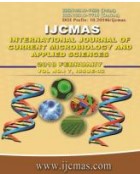


 National Academy of Agricultural Sciences (NAAS)
National Academy of Agricultural Sciences (NAAS)

|
PRINT ISSN : 2319-7692
Online ISSN : 2319-7706 Issues : 12 per year Publisher : Excellent Publishers Email : editorijcmas@gmail.com / submit@ijcmas.com Editor-in-chief: Dr.M.Prakash Index Copernicus ICV 2018: 95.39 NAAS RATING 2020: 5.38 |
The exploration of genetically variable accessions is the key source of germplasm conservation and potential breeding material for the future. The more diverse group of cultivars provides an ample opportunity to breeders for re-leasing new and superior varieties, considering their quality traits for direct commercial utilization. In this study, we analyzed genetic structure, diversity and relationships in 66 accessions of Cicer arietinum using SSR molecular markers. A total of 44 PCR based SSR primers were used for molecular characterization of 66 accessions. These primers found to be polymorphic genetic diversity among local and exotic accessions. A total of 66 different reproducible bands were amplified, most of them are polymorphic. The number of bands per primer ranged from 2 to7 with an average of 3.88 bands per primer. The size of amplified products ranged from 60 bp (CICER CAST MS2) to 400 bp (CICER TA 28). Maximum numbers of polymorphic bands (7) were obtained with the primers viz., CICER TA 22 and CICER TA 28. Whereas, similarity index of pair-wise comparisons estimated on the basis of all the 66 primers ranged from 0.43 to 0.97. Highest genetic similarity (0.97) showed between DFP02-7024 and DFP02-7024; DFP02-7047 and DFP02-7048, indicating that they are genetically quite similar, whereas DFP02-7041 showed least similarity (0.43). Genetic variability of primers was scored by cluster analysis through UPGMA per-cent disagreement. Most of the diversity was confined to the wild species, which had higher values of polymorphic information content, gene diversity and heterozygosity than the cultivated species, suggesting a narrow genetic base for cultivated chickpea.
 |
 |
 |
 |
 |